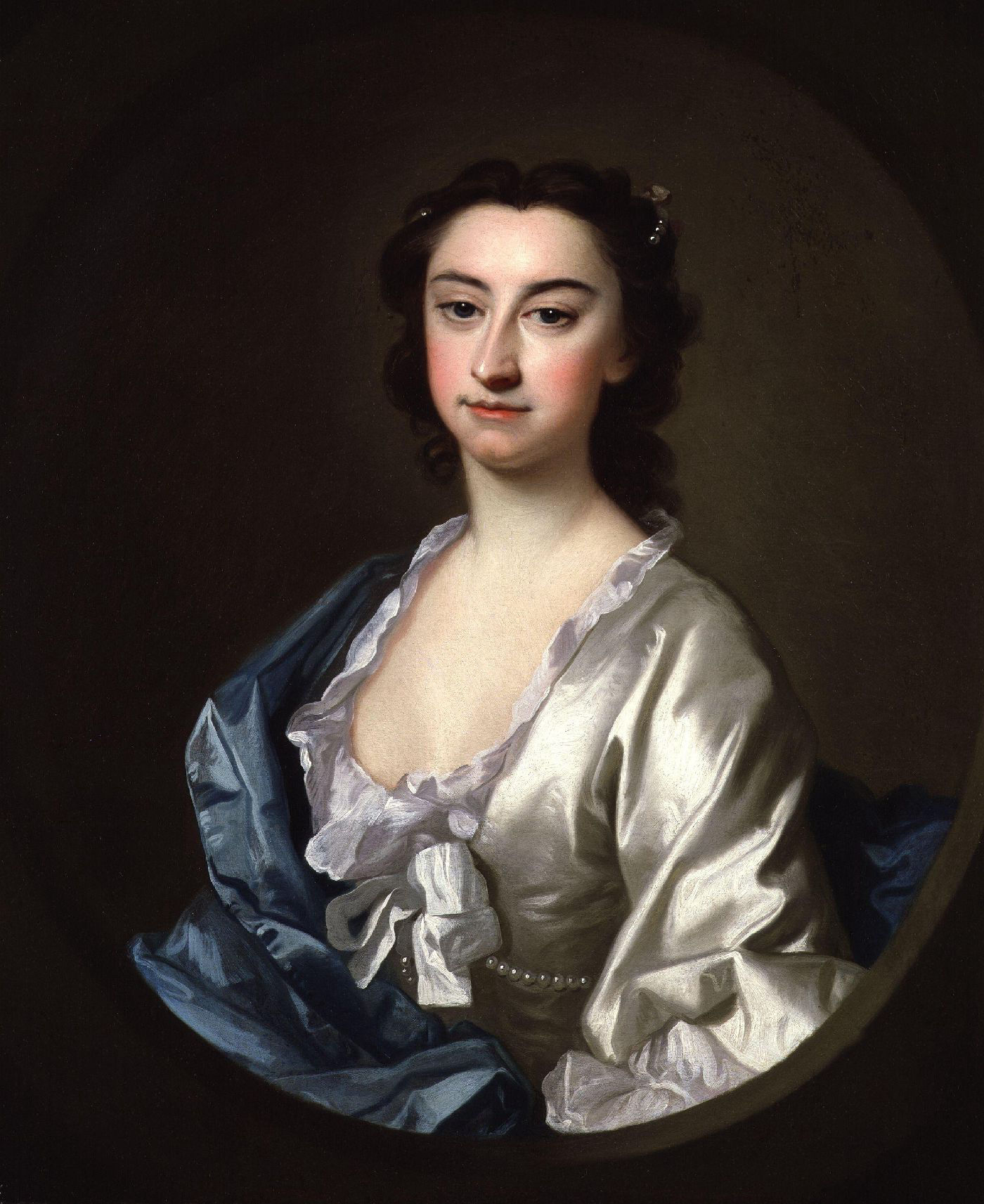
Susanna Cibber
Within the decade that followed Handel’s composition of Messiah in 1741, nearly a dozen different casts and configurations of vocal soloists were employed by the composer during those first ten years of what would become a never-ending history of performances worldwide. In each case, and for the remaining years of Handel’s life, he made revisions to his score in order to best utilize the particular talents of the solo singers on hand. While it is certainly true that Handel’s arrangements and transcriptions of arias that were employed for the work’s premiere in Dublin (1742) were due to the inadequacy of some of the singers at his disposal there, all subsequent revisions sought to show both the artists and the work in their best light. Customizing a musical work for the sake of the performers was not uncommon. In fact, it was not unheard of for an operatic vocalist (of necessarily considerable reputation) to carry along his or her favorite arias from city to city, insisting that they be incorporated into otherwise intact and singularly composed musical works for the stage. This indulgence was not as unreasonable as one might first assume.
The operatic style during Handel’s day has since become known as opera seria, a term that literally means “serious” opera and that was devised to mark the differences between those works and opera buffa, comic operas that were the outgrowth of commedia dell’arte. There were strict conventions within opera seria, including the utilization of the da capo, or A-B-A, format for arias. Secco recitatives, accompanied only by continuo (usually harpsichord with violoncello), were used to reveal plot details and to introduce the arias (or, rarely, duets) that would illuminate the emotions of whichever character would sing them. But there were also non-musical conventions of equally practical importance. In most cases the singer would exit at the end of an aria; hence the term “exit aria.” Of course, one of the primary reasons for this theatrical device was to solicit applause from the audience for the singer (although some of the approval might just as well have been intended for the composer). And each principal singer would fully expect to sing a number of arias in a variety of moods; lamentation, revenge, defiance, melancholy, anger, and heroic virtue were common sentiments. The texts of the arias were rarely longer than four or eight lines, and rather generic, so it was more or less reasonable that a singer could substitute a favorite aria from another work so long as the general emotion was appropriate.

Susanna Cibber
Other traditions further supported this kind of expected artistic license. In most cases, final arias within any opera of the period were always awarded to the most important singer, not necessarily the most important character. This sort of deference to the talent made a great deal of sense as, during Handel’s day, the singers themselves were as much of an attraction to the audience, if not more so, as the composers and their works might have been. So, in Handel’s implementations of various casts of Messiah soloists, he made redistributions of the workload to be fair or, in some cases, to be flattering to the members of any particular roster. When surveying all of the versions of Messiah, it is very interesting to look first at the assignment of the final aria, “If God be for us.” Although originally composed for soprano, even for the premiere he altered the key so that it could be sung by the contralto, Susanna Cibber, a singing actress that Handel found to be tremendously compelling. Over the next few years he continued to assign that “status” aria to her until 1749, the year before the first performance of Messiah as a charity event for London’s Foundling Hospital. In this case it was awarded to a treble, or boy soprano, perhaps as a prescient indication of discussions that were underway to bring the oratorio into that venue, a home for abandoned or orphaned children. And the following year, in 1750, it was again transposed down a few keys so that it could be sung by the most recently arrived operatic star, the great Italian castrato, Gaetano Guadagni (1728-1792). Only for the last performance of Messiah conducted by Handel in 1754 was the final aria heard as it was first composed, for soprano.
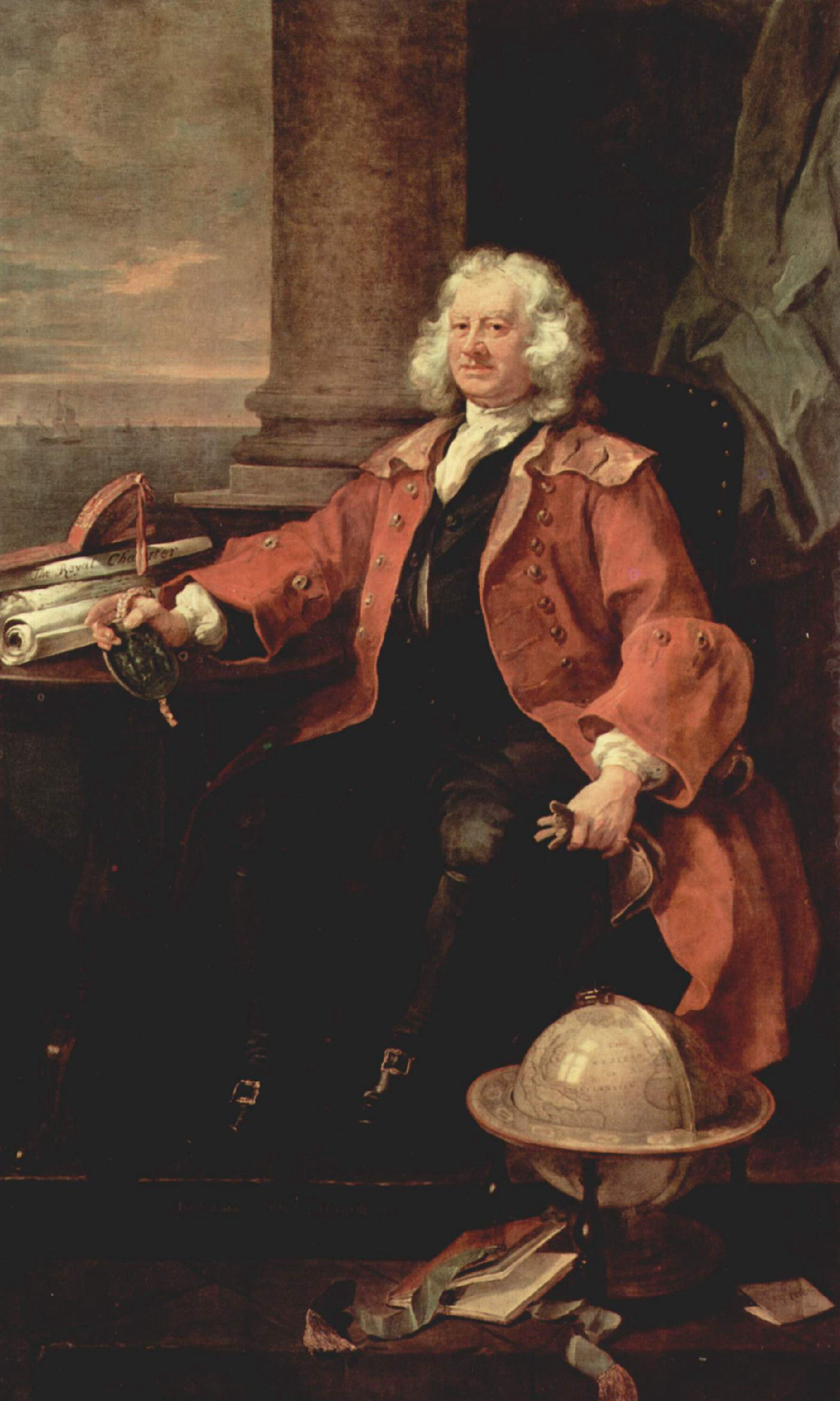
Thomas Coram
London’s Foundling Hospital, a home “for the maintenance and education of exposed and deserted young children,” was established in 1739 in the Bloomsbury area. Its founder, Thomas Coram (1668-1751), was a sea captain and had spent a number of his early years in the American colonies. Following a career as a successful London merchant, he turned his attention to philanthropy and, in particular, rescuing homeless, abandoned children. At that time, charity and philanthropy had become not only critically essential to the survival of Londoners as a whole, but it had also gained an oddly self-serving functionality as part of the fantastic expansion of London and the greater English empire. The rate of growth of London during the 18th century was exponential. About three fourths of Londoners had been born elsewhere. Its culture was as diverse as the most modern 21st-century city. London offered opportunities and wealth to the industrious and ambitious, as well as a thriving underworld, anonymity, and meager subsistence to criminals and the unskilled. Its hierarchical systems of social status were engrained, accepted, and treasured, despite the fact that the 18th century offered all Londoners the chance to upgrade their places and stations within that cosmopolis. Ironically, though, even those who were able to buy into higher levels of society through their success as merchants were as eager as the blue-blooded aristocracy to maintain whatever distinctions of social status could be maintained. The wealthy typically lived in five-story townhouses while the lower classes (those not housed as servants in the top floors of the elite’s homes) often lived in terribly unhealthy and cramped hovels. During most of the 1700s, Londoners were subjected to dreadful pollution, reprehensibly unsanitary conditions, and mostly unbridled crime.
Many of those poor conditions were the result of the preponderance of manufacturing industries within London’s commercial organism. About a third of London’s population were employed by manufacturing ventures, and the resulting pollution had turned the Thames River into, literally, a sewer. Still, this flourishing business culture helped increase overseas trade at least threefold during the century, and the spoils were global political power and domestic wealth. But the victims of all this were the children. Many lived only a few short years, and still others were abandoned to live on their own in the filth, smoke, and mire of London’s poorer quarters.
In the face of such undeniable misery, the wealthy could hardly turn a blind eye. During an era of destitution, depravity, and victimization, the beliefs of the Latitudinarian branch of the Church of England were timely assertions that benevolent and charitable deeds, rather than (or at least in addition to) the formalities of church worship, were essential to the quality of the moral state of the individual. Only by engaging in acts of compassion and by the establishment of a supporting relationship with the less fortunate could their plights, their suffering, and the terrible waste of human life be acceptably mitigated and tolerated.
Thus, charity became fashionable. Merchants supported charities that in turn supported the working class. They needed healthy workers in great numbers to keep their machines well-oiled and their industries thriving. Consumers were needed on the other side of the coin, so to speak, so the maintenance of the lower classes was in the best interest of those entrepreneurs. The kingdom itself needed to be defended at sea and abroad, so healthy battalions had to be provided. By supporting the less fortunate and encouraging their strength and independence, to a degree, those who had newly acquired wealth could gain prestige and propriety while nurturing their economic self-interests. To have a “bleeding heart” was especially in vogue among London’s upper-class women. Their ever-increasing opportunities to fashion socially relevant activities led quite naturally to their involvement in charities, which in turn substantiated their refinement, respectability, and moral rank. William Hogarth (1697-1764), the great English painter, satirist, and cartoonist, called this transformative time “a golden age of English philanthropy” and one of the greatest results of it was the Foundling Hospital.
In 18th-century London, the term “hospital” was applied to institutions for the physically ill as well as for the mentally ill, and to organizations that, through hospitality, supported particular factions of London’s population including sailors, refugees, penitent prostitutes, and destitute children. To a great degree, the efforts of Coram, assisted by Hogarth and Handel, firmly established the Foundling Hospital as one of England’s most long-lived and admirable benevolent institutions. Even before the buildings were completed—a process that took ten years from 1742 to 1752—children were first admitted to temporary housing in March, 1741. No questions were asked, but overcrowding quickly led to the establishment of rules for acceptance. The requirement that children be aged no more than two months was relaxed by the House of Commons in 1756 so that children up to twelve months would be accepted. During the next few years, more than 15,000 infants were left at its doors. Even within the Hospital, though, more than two thirds of them would not survive long enough to be apprenticed during their teenage years.
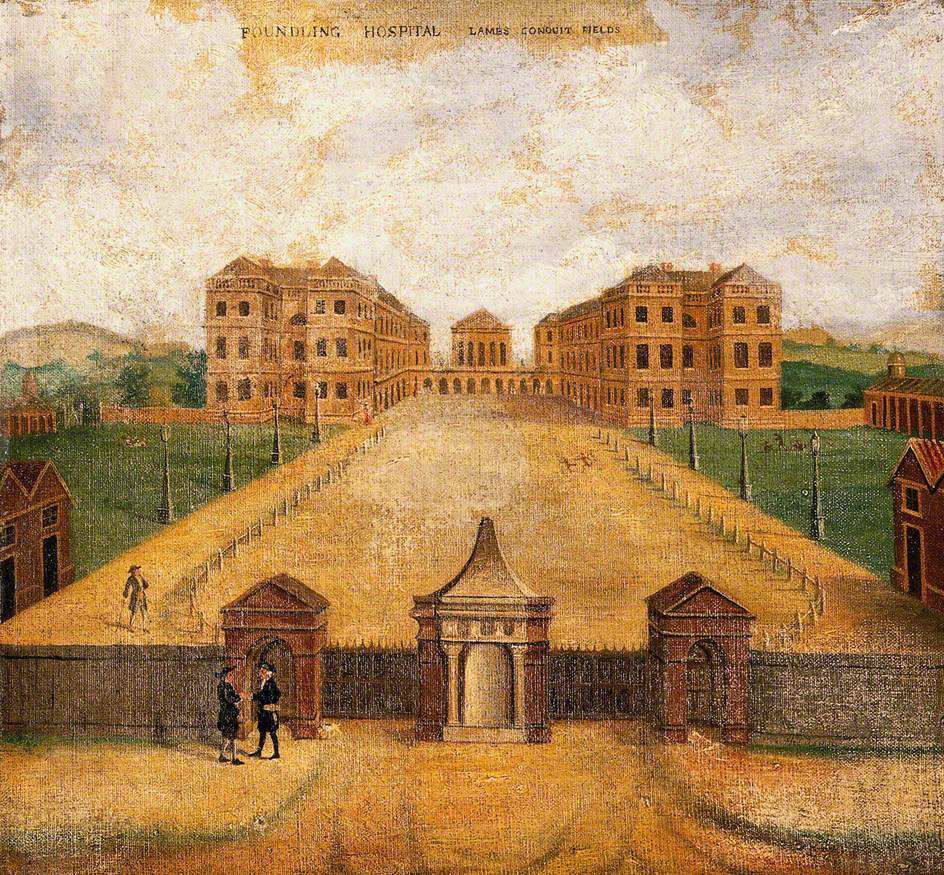
London's Foundling Hospital
In the same year that the Foundling Hospital accepted its first charges, Handel composed Messiah. Charles Jennens, the librettist for Messiah, had probably made the suggestion to Handel that the premiere of the work might take place in Dublin as a charity event. In fact, on March 27, 1742, Faulkner’s Dublin Journal published an announcement that:
“For Relief of the Prisoners in the several Gaols, and for the Support of Mercer’s Hospital in Stephen’s Street, and of the Charitable Infirmary on the Inns Quay, on Monday the 12th of April, will be performed at the Musick Hall in Fishamble Street, Mr. Handel’s new Grand Oratorio, call’d the Messiah…”
The previous decade or so had been quite unpleasant for Handel. He had begun to suffer financial difficulties, and by the early 1730s his professional life was simply unraveling. He was nearly bankrupt and had fallen very much out of the critical favor of the aristocratic public for whom he had composed his Italian operas. They were expensive to produce and not accessible enough for his audience. But, in fact, Handel himself was the object of what must have felt like brutal betrayal by his patrons, his audience, and even his musicians.
For the first half of his life, Handel had led a charmed existence. He seems to have waltzed into one happy situation after another, in which he enjoyed the patronage of royalty, the aristocracy, and the culture-seeking population at large. He was unexaggeratedly a national hero, despite his non-domestic origins. He had lived in extravagant estates, kept the most celebrated artists, writers, and musicians in his closest circles, and profited—although, not necessarily financially—from the tremendous favor that was bestowed upon him by an entire empire. His unprecedented success was so irreproachable that he was, without a doubt, completely unprepared for what amounted to a staggering fall from grace. But what emerged in 1741-42 was a work that would transcend the boundaries of musical forms, subject matter, social and cultural expectations, and, eventually, the bitterness of his rivals. And it would restore “the great Mr. Handel” to the revered status that he had enjoyed decades before.
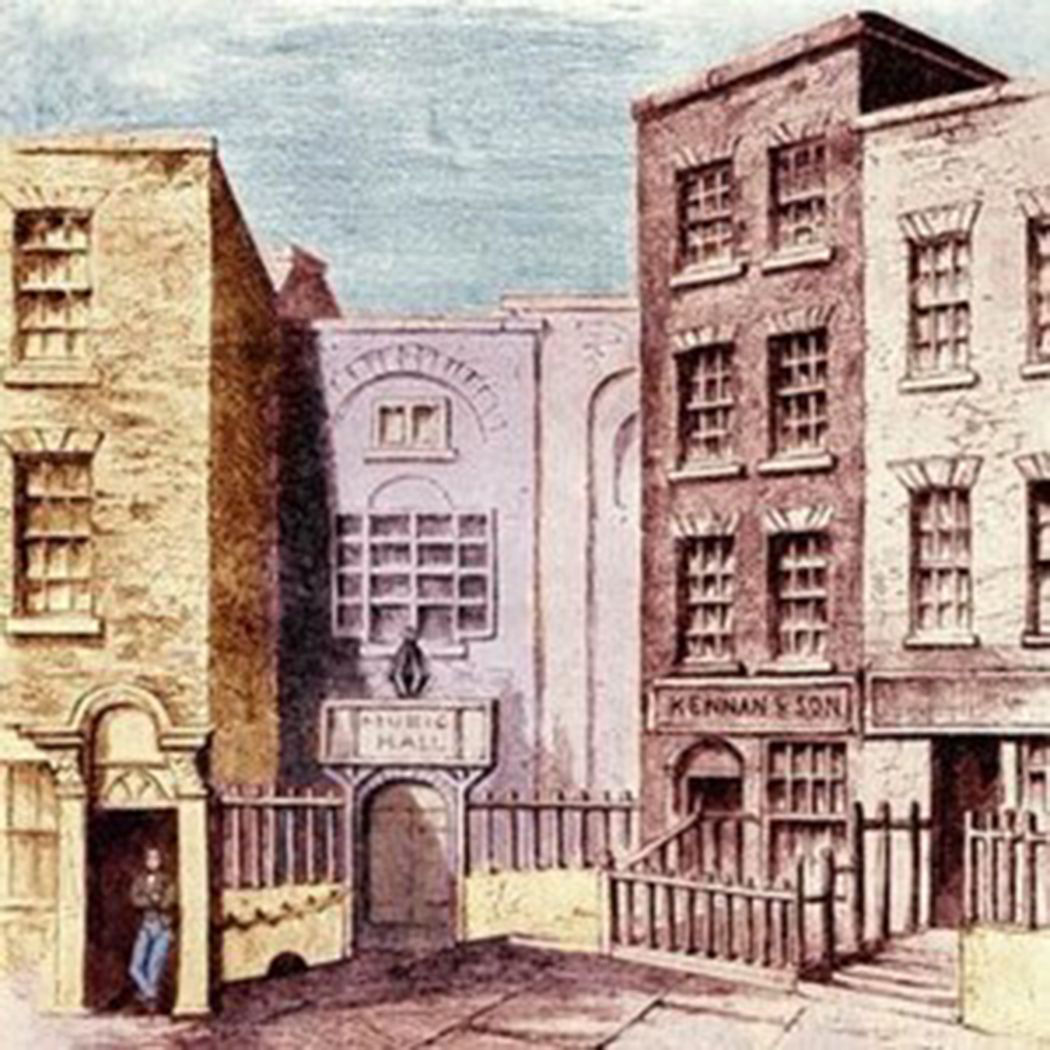
Mr. Neal's Hall
The first performance of Messiah took place on April 13, 1742 in Dublin’s newest concert hall, which was built by the Charitable Music Society. Alternatively named the Great Music Hall on Fishamble Street, the New Music Hall, or Mr. Neale’s Hall (named after William Neale, the music publisher who led the Charitable Music Society), it was a stately building, designed by the Dublin architect Richard Castle, featuring two rows of boxes, a slanted parterre, lovely ornamental details including fluted columns and pilasters on the raised performance platform, and an arched ceiling that created a fine acoustic. Mirrors were also incorporated into the trimmings, so that Dublin’s finest could view themselves approvingly. The hall had opened only a few weeks before Handel arrived to present his season of concerts.
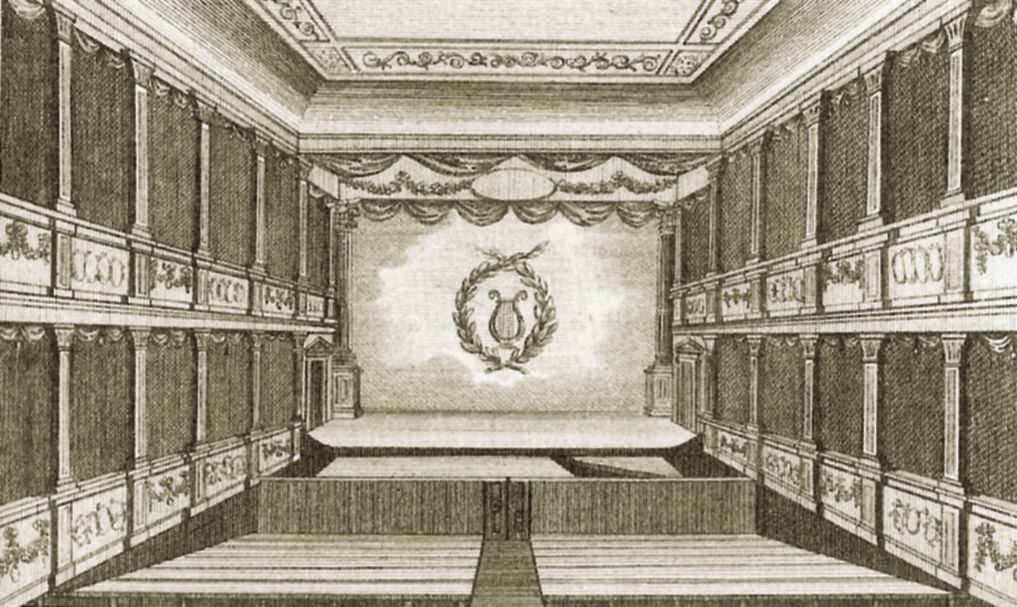
Interior of Dublin's New Music Hall
The premiere of Messiah was a tremendous success. The review that appeared in Faulkner’s Dublin Journal proclaimed:
“Words are wanting to express the exquisite Delight it afforded to the admiring crowded Audience. The Sublime, the Grand, and the Tender, adapted to the most elevated, majestic and moving Words, conspired to transport and charm the ravished Heart and Ear.”
Performances in subsequent years took place in London, but those were met with less enthusiastic receptions. Messiah had blurred the distinctions between opera, oratorio, passion, and cantata, and perhaps some Londoners found this to be a fundamental fault. So it is fascinating to note that when the function of Messiah was returned to that of a work presented for the benefit of charities, and when the venue became an ecclesiastical structure rather than a theater, the oratorio took hold of its permanent place in the hearts of audiences, then in London and now throughout the world.
For at least one year before the first Foundling Hospital performance of Messiah in 1750, Handel was involved with the charity, probably drawn to it through his associations with Hogarth and the music publisher John Walsh (1709-1766) who had been elected a governor in 1748. On May 4, 1749, Handel had made an offer, which was gratefully accepted, to present a benefit concert of vocal and instrumental music to help in the completion of the hospital’s chapel. The hospital reciprocated with an invitation to Handel, which he initially declined, to become one of its governors. On May 27th, Handel directed a performance (in the unfinished chapel) of excerpts from his Fireworks Music, Solomon, and the newly composed Foundling Hospital Anthem, “Blessed are they that considereth the poor and needy.” (The Foundling Hospital Anthem was Handel’s last work of English church music.) The “Hallelujah” chorus from Messiah was the final work, a premonition of what was in store for the following year. Royalty were in attendance.
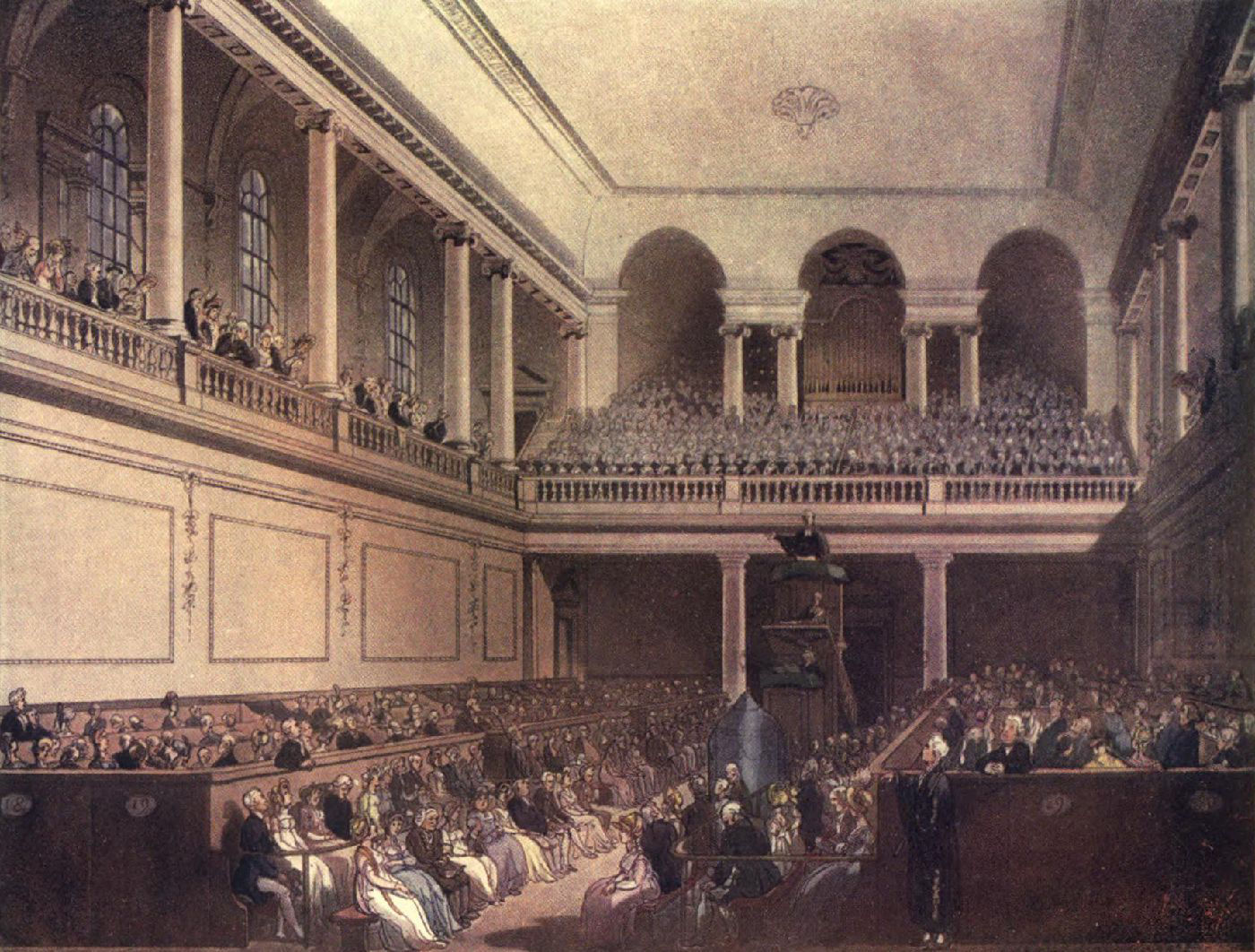
Interior of the London Foundling Hospital Chapel
Nearly one year later, on May 1, 1750, Handel performed Messiah in the (still not quite finished) chapel. That day marked what could be seen as the most significant day in Handel’s career. The benefit concert’s success was extraordinary. More than 1,000 people crowded into the space, and more were turned away. Massive public attention to the event, coupled with unequivocal approbation for the oratorio, served Handel well and generated new commitment on the part of the London audience to uphold Handel and his oratorios as the great beacons of English music that they are. He became a governor of the hospital; since more than £1,000 had been raised by his performances, the fee required of governors was waived. Due to the overcrowded conditions on May 1, a second performance was offered on May 15, especially to those who were turned away a fortnight before, that resulted in the first documentation of an entire audience standing for the “Hallelujah” chorus.
The most noteworthy musical aspect of the 1750 Foundling Hospital version of Messiah is the reworking of the aria, “But who may abide.” In this year, Handel employed the castrato, Gaetano Guadagni, who had arrived in London as part of an Italian opera company two years before, in 1748, at the age of twenty. The music historian Charles Burney (1726-1814) wrote about Guadagni:
“His voice was then a full and well toned counter-tenor; but he was a wild and careless singer. However, the excellence of his voice attracted the notice of Handel, who assigned him the parts in his oratorios of the Messiah and Samson, which had been originally composed for Mrs. Cibber…”
Handel composed a new middle section of the aria, taking advantage of Guadagni’s bravura vocal technique as well as his apparently considerable low notes. Two other arias were also reworked for Guadagni: “Thou art gone up on high” and “How beautiful are the feet.” Recent research seems to indicate that the alto arrangement of “How beautiful are the feet” was only an afterthought. For the May 1, 1750, performance, Handel had seven soloists (female soprano, boy treble, female contralto, male castrato, countertenor, tenor, and bass). But two weeks later, on May 15, when the work was offered for a second time especially to those who were turned away a fortnight before, the soprano must have fallen ill. Emergency reassignments were put in place, and the alto arrangement of “How beautiful are the feet” was one of them. In all fairness, however, it might have been that Handel was so pleased with Guadagni’s singing that he took that opportunity to give the singer another one of the oratorio’s “gem” arias.
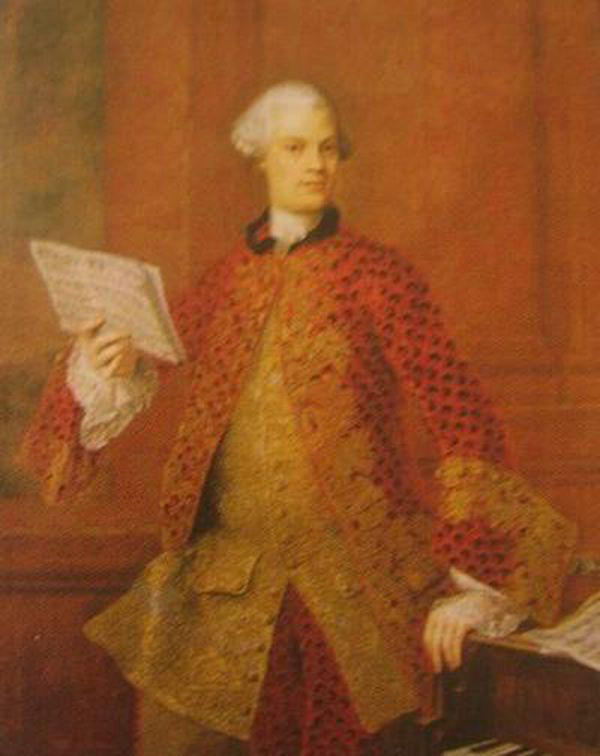
Gaetano Guadagni
In subsequent years, the Foundling Hospital continued to rely upon annual performances of Messiah for significant income. But Handel’s life was approaching its very real twilight. The great colleague whom Handel never met, Johann Sebastian Bach, had undergone two operations on his eyes, both unsuccessful, the second of which led within months to Bach’s death in 1750. By the next year, Handel’s own eyesight was deteriorating rapidly. By March 1751, he was blind in one eye but nevertheless directed two performances of Messiah (in the still unfinished chapel) and even played voluntaries on the organ. 1752 brought more performances of Messiah, still under the composer’s direction, but his eyesight continued to deteriorate despite various treatments and an operation. On August 17 a London newspaper reported that Handel had been “seiz’d a few days ago with a Paralytick [sic] Disorder in his Head which has deprived him of Sight,” and in March of 1753 Handel’s dear and longtime friend, Lady (Susan) Shaftesbury, reported that (at a performance) “it was such a melancholy pleasure, as drew tears of sorrow, to see the great though unhappy Handel, dejected, wan and dark, sitting by, not playing on the harpsichord, and to think how his light had been spent by being overplied in music’s cause.”
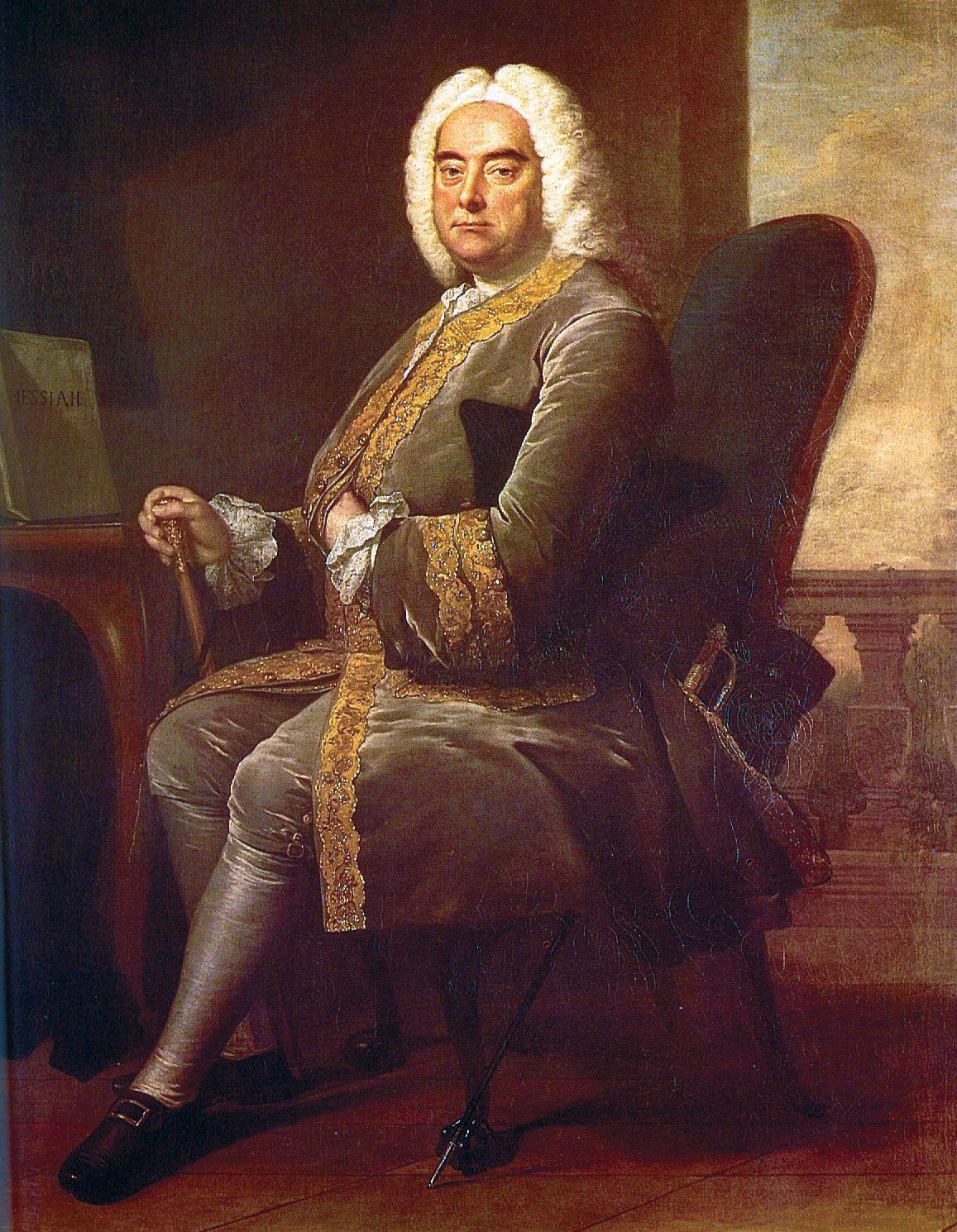
Handel, blind, seated with his score to "Messiah"
Soon, though, the Foundling Hospital Chapel was due for its official opening. Messiah was performed in April of 1753 in the Covent Garden Theatre, and three days later the Chapel was officially dedicated at a performance of the Foundling Hospital Anthem. The last report of any public performance conducted by the blind Handel comes from the May 1 revival of Messiah for the benefit of the Hospital. For this performance, the configuration of soloists was somewhat conventional for that era: one soprano, one male alto, one tenor, and one bass. The celebrated castrato Guadagni returned to London to sing his last performance of Messiah on this occasion, and Handel, although debilitated by blindness, played a voluntary and an organ concerto for the Foundling Hospital audience. Annual performances to benefit the charity continued until his death in 1759 and beyond, leading to more than 250 years of performances throughout the world, having reached millions upon millions of listeners.
Handel was a man of quiet yet firm religious convictions. Almost certainly nudged to embrace Catholicism during his years in Rome, and having been presented with the idea of converting to the Church of England especially during the years of rather significant monarchical patronage in London, he remained a rather staunch Lutheran. Ecclesiastics were prevalent in his mother’s family, and his Evangelical-Lutheran identity may very well have stemmed partially from a desire to retain a life-long connection to his Saxon background and heritage. It follows then that, while Messiah is certainly considered by any audience to be a “Grand Musical Entertainment”—as it was sometimes called in Handel’s day—the composer is purported to have said,
“I should be sorry if I only entertained them; I wished to make them better.”
© Jeffrey Thomas, 2015 All rights reserved.